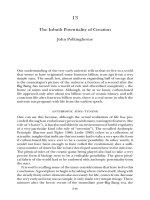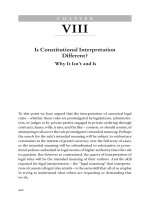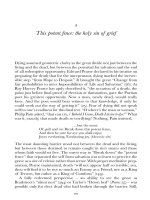Different vocabulary3 pot
Bạn đang xem bản rút gọn của tài liệu. Xem và tải ngay bản đầy đủ của tài liệu tại đây (64.31 KB, 11 trang )
ye
YE
THE
Those who study the history of English know that the word often misread as “ye” in Middle English is good old “the” spelled with an unfamiliar
character called a thorn which looks vaguely like a “Y” but which is pronounced “TH.” So all those quaint shop names beginning “Ye Olde” are based
on a confusion: people never said “ye” to mean “the.” However, if you’d rather be cute than historically accurate, go ahead. Very few people will know
any better.
List of errors
file:///C|/Temp/livres/commonerrors/errors/ye.html03/09/2005 15:40:33
yea/yeah/yay
YEA/YEAH/YAY
“Yea” is a very old-fashioned formal way of saying “yes,” used mainly in voting. It’s the opposite of
—and rhymes with—“nay.” When you want to write the common casual version of “yes,” the correct
spelling is “yeah” (sounds like “yeh” ). When the third grade teacher announced a class trip to the
zoo, we all yelled “yay!” (the opposite of “boo”!). That was back when I was only yay big.
List of errors
file:///C|/Temp/livres/commonerrors/errors/yea.html03/09/2005 15:40:33
yoke/yolk
YOKE/YOLK
The yellow center of an egg is its yolk. The link that holds two oxen together is a yoke; they are
yoked.
List of errors
file:///C|/Temp/livres/commonerrors/errors/yoke.html03/09/2005 15:40:33
you/you
YOUR/YOU
“I appreciate your cleaning the toilet” is more formal than “I appreciate you cleaning the toilet.”
List of errors
file:///C|/Temp/livres/commonerrors/errors/youryou.html03/09/2005 15:40:34
your/you’re
YOUR/YOU’RE
“You’re” is always a contraction of “you are.” If you’ve written “you’re,” try substituting “you are.”
If it doesn’t work, the word you want is “your.” Your writing will improve if you’re careful about
this.
List of errors
file:///C|/Temp/livres/commonerrors/errors/your.html03/09/2005 15:40:34
you’ve got another thing coming
YOU’VE GOT ANOTHER THING COMING
YOU’VE GOT ANOTHER THINK COMING
Here’s a case in which eagerness to avoid error leads to error. The original expression is the last part of a deliberately ungrammatical joke: “If that’s what
you think, you’ve got another think coming.”
List of errors
file:///C|/Temp/livres/commonerrors/errors/thing.html03/09/2005 15:40:34
Non-Errors
Non-Errors
(Those usages people keep telling you are wrong but which are actually standard in English.)
Split infinitives
For the hyper-critical, “to boldly go where no man has gone before” should be “to go boldly. . . .” It
is good to be aware that inserting one or more words between “to” and a verb is not strictly speaking
an error, and is often more expressive and graceful than moving the intervening words elsewhere; but
so many people are offended by split infinitives that it is better to avoid them except when the
alternatives sound strained and awkward.
Ending a sentence with a preposition
A fine example of an artificial “rule” which ignores standard usage. The famous witticism usually
attributed to Winston Churchill makes the point well: “This is the sort of English up with which I will
not put.” See The American Heritage Book of English Usage. Jack Lynch has some sensible
comments on this issue. If you think you know the original version of this saying, click here.
Beginning a sentence with a conjunction
It offends those who wish to confine English usage in a logical straitjacket that writers often begin
sentences with “and” or “but.” True, one should be aware that many such sentences would be
improved by becoming clauses in compound sentences; but there are many effective and traditional
uses for beginning sentences thus. One example is the reply to a previous assertion in a dialogue:
“But, my dear Watson, the criminal obviously wore expensive boots or he would not have taken such
pains to scrape them clean.” Make it a rule to consider whether your conjunction would repose more
naturally within the previous sentence or would lose in useful emphasis by being demoted from its
position at the head of a new sentence.
Using “between” for only two, “among” for more
The “-tween” in “between” is clearly linked to the number two; but, as the Oxford English Dictionary
notes, “In all senses, between has, from its earliest appearance, been extended to more than two.”
We’re talking about Anglo-Saxon here—early. Pedants have labored to enforce “among” when there
are three or more objects under discussion, but largely in vain. Even the pickiest speaker does not
naturally say, “A treaty has been negotiated among England, France, and Germany.”
file:///C|/Temp/livres/commonerrors/errors/nonerrors.html (1 sur 7)03/09/2005 15:40:35
Non-Errors
Over vs. more than.
Some people claim that “over” cannot be used to signify “more than,” as in “Over a thousand baton-
twirlers marched in the parade.""Over,” they insist, always refers to something physically higher: say,
the blimp hovering over the parade route. This absurd distinction ignores the role metaphor plays in
language. If I write 1 on the blackboard and 10 beside it, 10 is still the “higher” number. “Over” has
been used in the sense of “more than” for over a thousand years.
Forward vs. forwards
Although some style books prefer “forward” and “toward” to “forwards” and “towards,” none of
these forms is really incorrect, though the forms without the final S are perhaps a smidgen more
formal.
Gender vs. sex
Feminists eager to remove references to sexuality from discussions of females and males not
involving mating or reproduction revived an older meaning of “gender,” which had come to refer in
modern times chiefly to language, as a synonym for “sex” in phrases such as “Our goal is to achieve
gender equality.” Americans, always nervous about sex, eagerly embraced this usage, which is now
standard. In some scholarly fields, “sex” is now used to label biologically determined aspects of
maleness and femaleness (reproduction, etc.) while “gender” refers to their socially determined
aspects (behavior, attitudes, etc.); but in ordinary speech this distinction is not always maintained. It
is disingenuous to pretend that people who use “gender” in the new senses are making an error, just
as it is disingenuous to maintain that “Ms.” means “manuscript” (that’s “MS”). Nevertheless, I must
admit I was startled to discover that the tag on my new trousers describes not only their size and
color, but their “gender.”
Using “who” for people, “that” for animals and inanimate
objects
In fact there are many instances in which the most conservative usage is to refer to a person using
“that”: “All the politicians that were at the party later denied even knowing the host” is actually
somewhat more traditional than the more popular “politicians who.” An aversion to “that” referring
to human beings as somehow diminishing their humanity may be praiseworthily sensitive, but it
cannot claim the authority of tradition. In some sentences, “that” is clearly preferable to “who“: “She
is the only person I know of that prefers whipped cream on her granola.” In the following example, to
exchange “that” for “who” would be absurd: “Who was it that said, ” A woman without a man is like
a fish without a bicycle” ?”*
*Commonly attributed to Gloria Steinem, but at least one source says she was quoting Irina Dunn.
“Since” cannot mean “because.”
file:///C|/Temp/livres/commonerrors/errors/nonerrors.html (2 sur 7)03/09/2005 15:40:35
Non-Errors
“Since” need not always refer to time. Since the 14th century, when it was often spelled “syn,” it has
also meant “seeing that” or “because.”
Hopefully
This word has meant “it is to be hoped” for a very long time, and those who insist it can only mean
“in a hopeful fashion” display more hopefulness than realism.
Momentarily
“The plane will be landing momentarily” says the flight attendant, and the grumpy grammarian in
seat 36B thinks to himself, “So we’re going to touch down for just a moment?” Everyone else thinks,
“Just a moment now before we land.” Back in the 1920s when this use of “momentarily” was first
spreading on both sides of the Atlantic, one might have been accused of misusing the word; but by
now it’s listed without comment as one of the standard definitions in most dictionaries.
Lend vs. loan
“Loan me your hat” was just as correct everywhere as “lend me your ears” until the British made
“lend” the preferred verb, relegating “loan” to the thing being lent. However, as in so many cases,
Americans kept the older pattern, which in its turn has influenced modern British usage so that those
insisting that “loan” can only be a noun are in the minority.
Regime vs. regimen
Some people insist that “regime” should be used only in reference to governments, and that people
who say they are following a dietary regime should instead use “regimen”; but “regime” has been a
synonym of “regimen” for over a century, and is widely accepted in that sense.
Near miss
It is futile to protest that “near miss” should be “near collision.” This expression is a condensed
version of something like “a miss that came very near to being a collision” and is similar to “narrow
escape.” Everyone knows what is meant by it and almost everyone uses it. It should be noted that the
expression can also be used in the sense of almost succeeding in striking a desired target: “His
Cointreau soufflé was a near miss."
“None” singular vs. plural
Some people insist that since “none” is derived from “no one” it should always be singular: “none of
us is having dessert.” However, in standard usage, the word is most often treated as a plural. “None
file:///C|/Temp/livres/commonerrors/errors/nonerrors.html (3 sur 7)03/09/2005 15:40:35
Non-Errors
of us are having dessert” will do just fine.
Scan vs. skim
Those who insist that “scan” can never be a synonym of “skim” have lost the battle. It is true that the
word originally meant “to scrutinize,” but it has now evolved into one of those unfortunate words
with two opposite meanings: to examine closely (now rare) and to glance at quickly (much more
common). It would be difficult to say which of these two meanings is more prominent in the
computer-related usage, to “scan a document.”
Off of
For most Americans, the natural thing to say is “Climb down off of [pronounced ” offa” ] that horse,
Tex, with your hands in the air"; but many U.K. authorities urge that the “of” should be omitted as
redundant. Where British English reigns you may want to omit the “of” as superfluous, but common
usage in the U.S. has rendered “off of” so standard as to generally pass unnoticed, though some
American authorities also discourage it in formal writing. However, “off of” meaning “from” in
phrases like “borrow five dollars off of Clarice” is definitely nonstandard.
“Gotten” vs. “got.”
In England, the old past participle “gotten” dropped out of use except in such stock phrases as “ill-
gotten” and “gotten up,” but in the U.S. it is still considered interchangeable with “got” as the past
participle of “get.”
Till vs. ’til.
Since it looks like an abbreviation for “until,” some people argue that this word should always be
spelled “’til” (though not all insist on the apostrophe). However, “till” has regularly occurred as a
spelling of this word for over 800 years and it’s actually older than “until.” It is perfectly good
English.
Teenage vs. teenaged.
Some people object that the word should be “teenaged,” but unlike the still nonstandard “ice tea” and
“stain glass,” “teenage” is almost universally accepted now.
Don’t use “reference” to mean “cite.”
Nouns are often turned into verbs in English, and “reference” in the sense “to provide references or
citations” has become so widespread that it’s generally acceptable, though some teachers and editors
still object.
file:///C|/Temp/livres/commonerrors/errors/nonerrors.html (4 sur 7)03/09/2005 15:40:35
Non-Errors
Feeling bad
“I feel bad” is standard English, as in “This t-shirt smells bad” (not “badly”). “I feel badly” is an
incorrect hyper-correction by people who think they know better than the masses. People who are
happy can correctly say they feel good, but if they say they feel well, we know they mean to say
they’re healthy.
Unquote vs. endquote
Some people get upset at the common pattern by which speakers frame a quotation by saying
“quote . . . unquote,” insisting that the latter word should logically be “endquote”; but illogical as it
may be, “unquote” has been used in this way for about a century, and “endquote” is nonstandard.
Persuade vs. convince
Some people like to distinguish between these two words by insisting that you persuade people until
you have convinced them; but “persuade” as a synonym for “convince” goes back at least to the 16th
century. It can mean both to attempt to convince and to succeed. It is no longer common to say things
like “I am persuaded that you are an illiterate fool,” but even this usage is not in itself wrong.
“Preventive” is the adjective, “preventative” the noun.
I must say I like the sound of this distinction, but in fact the two are interchangeable as both nouns
and adjective, though many prefer “preventive” as being shorter and simpler. “Preventative” used as
an adjective dates back to the 17th century, as does “preventive” as a noun.
People should say a book is titled such-and-such rather than
entitled.
No less a writer than Chaucer is cited by the Oxford English Dictionary as having used “entitled” in
this sense, the very first meaning of the word listed by the OED. It may be a touch pretentious, but
it’s not wrong.
People are healthy; vegetables are healthful.
Logic and tradition are on the side of those who make this distinction, but I’m afraid phrases like
“part of a healthy breakfast” have become so widespread that they are rarely perceived as erroneous
except by the hyper-correct. On a related though slightly different subject, it is interesting to note that
in English adjectives connected to sensations in the perceiver of an object or event are often
transferred to the object or event itself. In the 19th century it was not uncommon to refer, for
instance, to a “grateful shower of rain,” and we still say “a gloomy landscape,” “a cheerful sight” and
file:///C|/Temp/livres/commonerrors/errors/nonerrors.html (5 sur 7)03/09/2005 15:40:35









